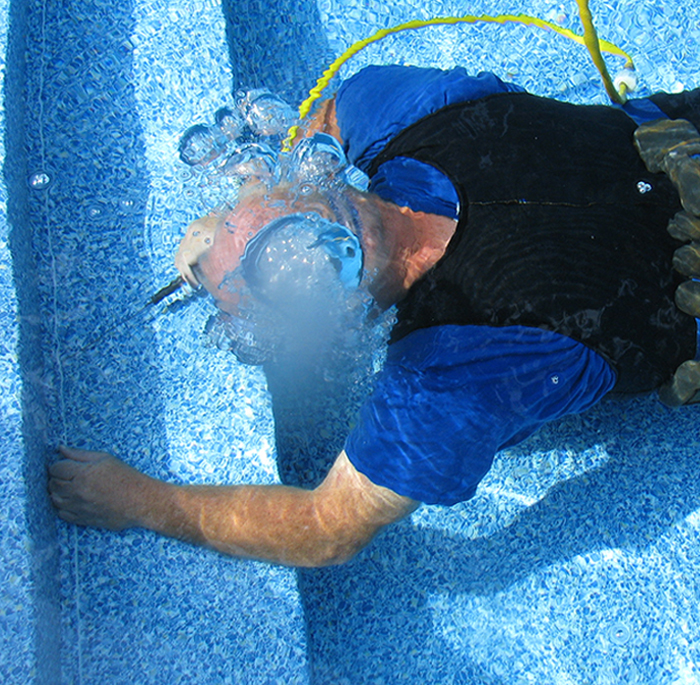
Discovering a pool leak can stress you out. You’ve probably heard horror stories about neighbors coming home to empty pools and flooded yards. What should you do now? How can you fix the pool leak? Should you try to repair a pool leak yourself or call in the professionals? Let’s find out.
Find Your Pool Leak
If you’re going to fix a pool leak, you’ll need to find out exactly where it’s coming from. Use the bucket test to narrow down the source. This test also helps you make sure your pool isn’t leaking due to evaporation or splashing. A good rule of thumb is that if your pool loses more than 1 in /week, you probably have a leak. If your pool’s water level goes down with the pump/filter system off, you might have a structural leak or a leak in your suction side plumbing. If your pool only loses water when it’s running, you probably have a leak in your pool pump system’s pressure side plumbing. Finding a pool leak isn’t easy, especially for the inexperienced. Searching for a leak can take a lot of time. When sealants fail, water can seep out of your pool and into the ground, out of sight. Small, steady drips may be hard to find amongst splashing, water features, and jets. Try to look for a steady leak. Often, pool owners think they have found the source, repair it, and are frustrated when their pool continues to leak. To lose over an inch per week, your pool leak will be more than a tiny drip now and then. A constant trickle is more likely the culprit.
Common Areas to Look for Pool Leaks
Pool leaks can happen just about anywhere. Your pool’s structure, fittings, accessories, and plumbing. Ignoring a pool leak can cost you a lot. It’s not just about refilling lost water. You’ll lose expensive pool chemicals. And if you keep your pool heated, you’re wasting energy too.
- Piping and Equipment. Suction side leaks will also often result in air in the pump basket, air bumping from the return lines, or air building up inside the filter tank. To eliminate the pump system as the source, shut off the pump, plug the drain, turn off the skimmer valve, and plug the return lines.
- Pool Surface. Look for cracks in the surface of your pool. They may be hidden by the tile line. Many leaks are hidden inside your skimmer where the plastic components meet your concrete pool. If you see a crack here, you can use pool putty to fix the leak.
- Underground. You may not be able to find a leak easily if it’s underground surrounding your pool’s structure or piping. Look for soft spots in your yard. Even if they are not wet or damp at the surface, you may only need to dig a little to find the source of the leak.
Pool Leak Detection and Repair Products
If you believe your leak is due to a structural leak, use test dye close to any suspected cracks. Turn off your pool equipment and put the dye near-wall fittings, pool lights, or wall steps. Be patient and wait for the dye to flow into the source of the leak.
- Flexible sealer – seals vinyl pool liners, gunite, plaster, plumbing, or fittings
- Epoxy and putty– repairs cracks in plaster, gunite, fiberglass, or acrylic
- Butyl tape – seals around fixtures or replaces leaky gaskets
- Vinyl patch – stops leaks above or below the water in vinyl pool liners
Leaks in your pool surface might seem like an easy fix. Just patch it up, right? But it’s important to choose the right product to fix your leak permanently. Epoxies work best for certain leaks. For others, you might want to opt for a rubber-based sealant or putty. Knowing when and how to use each of these products often takes knowledge and experience.
Why Call in the Professionals to Fix a Pool Leak?
Your local pool service company can help solve your pool leak problem. Many of our certified pool technicians have decades of experience looking for and repairing leaks. For stubborn leaks, we have tools and leak detection equipment to quickly find the problem, fix it, and get your family back to swimming. Even a pool test dye can be deceiving. It takes a trained eye to differentiate between a leak and natural movement in the water. Searching your pool’s bottom for leaks is especially difficult (and potentially unsafe) without professional equipment or scuba gear. If you’re seeing intermittent issues with pool water loss, the professionals can help you find out if changing pressures are contributing to your leak. With a pressure testing rig, they can introduce air into the pipe. With a large stethoscope, a technician can listen to the sound of the escaping air and find where a repair must be performed.
Pool Professionals Have the Equipment and Experience
Ultimately, your leak may require some digging. You don’t want to spend weeks poking around your backyard with a shovel-like you’re on some kind of treasure hunt. The Texas landscape is full of rocks, roots, and other obstacles. Let us use professional digging equipment to safely find your leak. If your leak is within the pool deck, you’ll need a concrete saw to expose the leaking or cracked pipe. Obviously, this kind of power equipment can be dangerous and destructive for novice users. Once the leak is repaired, our pool renovation professionals can put everything back the way it was before. Replacing sections of damaged piping calls for a working knowledge of plumbing concepts. Cutting pipes to the right lengths, using sealants properly, and proper use of fittings are essential. You don’t want to think your problem is fixed, put everything together, and bury your pipe again only to find that your pool leak is back.
Fix Your Pool Leak Today
Finding a pool leak can be a frustrating experience. Just locating your pool leak can take up a lot of your time. And all along, you’re losing water, chemicals, and energy. Wouldn’t you rather be enjoying your pool on the weekends instead of fishing for a leak? Fortunately, you don’t have to repair a pool leak yourself. Contact Gold Medal Pools and let our professional technicians take care of it. We can fix a pool leak fast! Stop worrying about your pool and start swimming stress-free this week!





